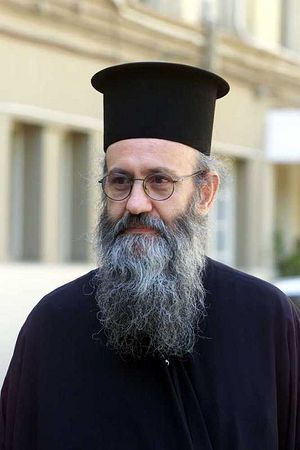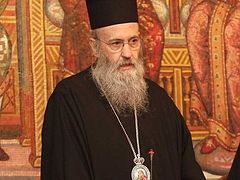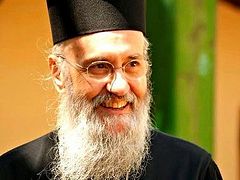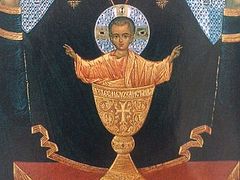SACRED METROPOLIS
OF NAFPAKTOS AND SAINT VLASSIOS
Nafpaktos, March 5, 2016
To
the Holy and Sacred Synod
of the Church of Greece
Ioannou Gennadiou 14
115 21 Athens
Your Beatitude the President [of the Holy Synod],
Bearing in mind the Synodal document numbered 755/351/16-02-2016, in which we are called to submit our views on the texts due to be discussed at the Holy and Great Council, I have the following to say:
In the texts unanimously adopted by the Synaxis of Primates of the Orthodox Churches (Chambesy-Geneva 21—28 January 2016) there are a few points in need of further revision and correction.
Of course, in agreement with the Regulations of Organization and Working Procedure of the Holy and Great Council of the Orthodox Church (Article 11), amendments, corrections and additions to the texts in question may be made during discussions on each subject at the plenary session of the Council, following the formulation of proposed amendments, corrections or additions.
This means that every Church, and also our Church, has the right to have opinions and a vote on each subject addressed in the texts which will be discussed. It thus gives freedom for each view to be expressed, and we as hierarchs are obliged to do so.
Primarily, I think that two texts are in need of necessary corrections:
1. “Relations of the Orthodox Church with the rest of the Christian world”
We notice in this text a confusion of terminology, which likely derives from the consolidation of two texts, namely the text on “Relations of the Orthodox Church with the rest of the Christian world” and the text “Orthodoxy and the Ecumenical Movement.”
However, if the necessary changes are not made, a theological and ecclesiological double-speak will prevail in this particular text, one which is inappropriate for synodical texts and thus also for texts of the Holy and Great Council.
In particular:
a) Terminology
The title of the text, “Relations of the Orthodox Church with the rest of the Christian world,” is correct because it uses precise terminology, with “the Orthodox Church” on one hand and “the rest of the Christian world” on the other. Furthermore, many expressions in the content of the text confirm the title, such as “The Orthodox Church, being the One, Holy Catholic and Apostolic Church, in her profound ecclesiastical consciousness” (Article 1), “with those separated from her, both far and near” (Article 4), “those who are external to her” (Article 6).
However, other expressions present in the text, that “the Orthodox Church acknowledges the existence in history of other Christian Churches and confessions which are not in communion with her” (Article 6) need to be brought into harmony with the title in order for this double-speak not to remain.
The phrase “the Orthodox Church acknowledges the existence in history of other Christian Churches and confessions” should therefore be replaced by the phrase: “the Orthodox Church knows that her charismatic limits correspond to her canonical boundaries, as she also knows that there exist other Christian Confessions, which are cut off from her and do not find themselves in communion with her.”
The same should also happen with respect to other passages.
b) The unity of the Church
The passage which speaks on the unity of the One, Holy Catholic and Apostolic Church is right to state that “the Unity of the Church” (Orthodox Church should be added here) “is impossible to shatter” (Article 6), because as it again rightly stresses “the responsibility of the Orthodox Church and her ecumenical mission with regard to the unity expressed by the Ecumenical Councils,” which “in particular, stressed the indissoluble link existing between true faith and sacramental communion” (Article 3).
However, other passages in the text, which imply that the unity of the Church has been broken and that there are attempts to recover it, need to be corrected.
In particular:
The statement that the Orthodox Church participates in theological dialogues “aimed at seeking the lost Christian unity on the basis of the faith and tradition of the ancient Church of the Seven Ecumenical Councils” (Article 5), indicates that what is said elsewhere, that the unity of the Church “is impossible to shatter” (Article 6), is not true.
This passage therefore needs to be corrected lest the decisions of the Holy and Great Council appear to contain double-speak, that it does not provide clear teaching, but leaves “open windows” for other interpretations.
It should read: “the Orthodox Church participates in dialogues with Christians belonging to various Christian Confessions, for the sake of their restoration to her faith, tradition and life.”
c) Theological dialogues in relation to Baptism
There is in the text one paragraph which appeals to “baptismal theology,” which is the basic position of the Second Vatican Council. The paragraph is as follows:
“The prospects for conducting theological dialogues between the Orthodox Church and other Christian Churches and confessions shall always be derived from the canonical criteria of established Church Tradition (canon 7 of the Second Ecumenical Council and canon 95 of the Quinisext Ecumenical Council)” (Article 20).
Canons 7 of the Second Ecumenical Synod and 95 of the Quinisext Ecumenical Council are concerned with the manner in which heretical parties at that time were to be received into the Orthodox Church, by exactness and by economy.
Canon 95 of the Quinisext Ecumenical Council, which repeats Canon 7 of the Second Ecumenical Council, stipulates that the Eunomians “who were baptized with one immersion” should be rebaptized. Montanists and Sabellians “who consider the Son to be the same as the Father, and are guilty in certain other grave matters, and all the other heresies” are also to be rebaptized. There is clearly cause for rebaptism whenever there is baptism by single immersion, identification of the Father with the Son and other heresies.
It is important that the Three Patriarchs of the East, (Cyril V of Constantinople, Matthew of Alexandria, Parthenios of Jerusalem) in the year 1756 issued an edict by which they interpret these canons in relation to the Westerners who come to Orthodoxy. By this stipulation, Western heretics are received into Orthodoxy as “profane and unbaptized,” seemingly due to there being variations both with regards to the doctrine of the Trinity, due to the teachings on the Filioque and the created divine energies (actus purus), and because there is also a difference in form, since baptism is not performed by immersion, but by “pouring” or “sprinkling” following the Council of Trent. The edict of the Three Patriarchs thus contains a very clear interpretation of the canons in question with regard to contemporary reality. We cite the following excerpt:
“The Second and the Quinisext Ecumenical Councils prescribe that those turning to Orthodoxy be considered as unbaptized who were not baptized by triple immersion, at each of which the name of one of the Divine Hypostases is pronounced, but were baptized by some other means. Adhering to these Holy and Divine decrees we consider heretical baptism to be worthy of judgement and repudiation inasmuch as it does not conform with but contradicts the Apostolic and Divine formation and is nothing more than a useless washing, according to the words of St. Ambrose and St. Athanasius the Great, neither sanctifying the catechumen nor cleansing him from sin. This is why we receive all heretics turning to Orthodoxy who were not baptized properly as not having been baptized and without any hesitation baptize them according to the apostolic and conciliar canons upon which the Holy Catholic and Apostolic Church of Christ—the common mother of us all—firmly rests. We affirm this, our unanimous decision which is in conformance with the apostolic and conciliar canons, with a written testament subscribed with our signatures.”[1]
It is obvious that what is written in Article 20 of the text prepared for adoption by the Holy and Great Council is an effort to implicitly withdraw this edict of the Three Patriarchs, which rests on the entirety of ecclesiastical tradition. As mentioned above, from the eighth century onwards there were introduced into Christian Confessions the heresies of the Filioque and actus purus, as well as the improper baptism of the “Roman Catholics” by pouring and sprinkling following the Council of Trent, as well as various heretical views in other Confessions.
Thus, in order for there to be a unity of thought throughout the entire text where it is written that the Orthodox Church is the One, Holy, Catholic and Apostolic Church, that its unity “is impossible to shatter,” that there exist “those who are external to her,” it is necessary that this paragraph is amended as follows:
The theological dialogues of the Orthodox Church with other Christian Confessions take place on the basis of the faith and praxis of the Orthodox Church, as determined by the decisions of the Ecumenical Councils. The reception of the heterodox into the Orthodox Church takes place both by exactness and by economy. Use of economy is observed when a Christian Confession performs baptisms by three immersions and emersions, according to the apostolic and patristic form, and the confession of the Holy, consubstantial and indivisible Trinity.
2. “The mission of the Orthodox Church in the modern world”
In this text there are a few expressions which, although widely used by Orthodox, come from modern existentialist philosophy and German Idealism, namely the expressions “value of the human person” and “communion of persons,” which should be replaced by the phrases “value of the human being” and “unity among human beings.”
In the final text signed at Chambesy-Geneva (January 21—28, 2016), some improvements were made to the text produced by the Fifth Pre-conciliar Pan-Orthodox Meeting (October 10—17, 2015), but there nonetheless remain a few expressions which speak of the “value of the human person” and are in need of further improvement.
In particular:
a) Human being and not human person
The text rightly makes reference to St. Gregory the Theologian, Eusebius and St. Cyril of Alexandria who speak about the value of the human being and not the human person. Likewise, mention is made of the “protection of the value of the human being” (1, Article 2), and “God’s plan for man” (1, Article 1).
But there remains in the final text a few expressions from the older text, such as “the value of the human person” (1, Article 1), “the general recognition of the lofty value of the human person” (1, Article 3), and “the notion of the human person” (2, Article 3).
The text therefore needs to be made uniform so that wherever mention is made of “human person” this is replaced by the word “human being,” which is understood by all.
b) Communion of persons
In the text there is a paragraph which is problematic from an Orthodox point of view. It says:
“One of the loftiest gifts of God to the human person both as a concrete bearer of the image of the personal God and as a member of a community of persons in the unity of the human race by grace reflecting the life and communion of the Divine Persons in the Holy Trinity, is the gift of freedom” (2, Article 1).
This paragraph speaks about “communion of Divine Persons,” in that the human race is a “communion of persons” which reflect “by grace … the life and communion of the Divine Persons in the Holy Trinity” and that this “constitutes the gift of freedom,” which is theologically inadmissible because it creates a confusion of the created and Uncreated, between the unity of man and the unity of the Triune God.
This paragraph needs to be replaced by the following paragraph:
God created man in His image and likeness and gave him intellect and autonomy: “He Who created the human person in the beginning made him free and autonomous, limiting him solely by the laws of the commandment” (Gregory the Theologian, 14, On Love for the Poor, 25. PG 35, 892A). Freedom was granted to man in order for him to be capable of progressing towards spiritual perfection, but at the same time entails the risk of disobedience, of estrangement from God and, through this, of the fall, from which come all the tragic consequences of evil in the world.
Justification for the replacement of phrases:
In order to justify the proposal that the phrase “value of the human person” be replaced by the phrase “value of the human being” and that the phrase “communion of persons reflecting the communion of Divine Persons” be deleted, the following theological positions will be pointed out:
1. The Fathers of the fourth century determined that the Triune God is Three Persons, having the same essence-nature-energy and particular hypostatic properties (unbegotten, begotten, proceeding). Person is defined as essence with hypostatic properties.
2. In the Triune God there is a distinction of Divine Persons, not a communion of persons. In other words, the Father communicates His essence to the Son through begetting, and to the Holy Spirit through procession. The Father thus communicates His essence to the other Persons, but not His Person or His hypostatic property. There is thus a communion of nature-essence, an indwelling and interpenetration of Persons, and not a communion of persons.
3. “The holy Fathers used hypostasis, person and individual to refer to the same thing” (St. John of Damascus). Christ is one Person Who has two natures which were united in His Person without confusion, without alteration, without division, without separation. Thus, the person is one and the individual is one. The word individual (atomo) consists of the negative a, the word tome, and means “not intersecting nor shared” (St. John of Damascus). This means that although Christ has two natures, they do not intersect in the one Person of Christ the Word. The distinction between person and individual comes from Western philosophy.
4. For man, the Fathers primarily used the term “man.” And there is a chasmic difference between created and Uncreated. Whatever happens with the Triune God does not happen with man. The theological concept of man is expressed by the term “in the image” and “according to the likeness,” which mean that he is lead towards deification.
In certain patristic texts man is spoken of as hypostasis, but always with the theological meaning of in the image and according to the likeness of God, with the principle of hypostasis (Heb. 3:14). And it is from this understanding that Elder Sophrony also writes, not from the perspective of modern philosophy.
5. Vladimir Lossky, who introduces into Orthodox vocabulary the term “person” in relation to man, remarks with regards to this: “As for me, I have to confess that I until now have not encountered in patristic theology any complete theoretical treatment of the human person, to go alongside the very clear teachings on the divine Persons or Hypostases.”
6. The problem, however, is not just the term “person” used in relation to man, but that the modern theories regarding the “human person” and even the “sanctity” and “dignity of the human person” associate nature with necessity and sin, and person with freedom, desire-will and love. Such ideas are reminiscent of Arianism and Monothelitism, which have been condemned by Ecumenical Councils.
7. Will and self-rule do not belong to the person, but to nature. The person is the one who desires, while desire is an appetite of nature and will is a result of the desire of the one who desires. When will-desire are seen as hypostatic, that is to say, belonging to the person, then each divine Person has Its own desire, will, freedom, something which results in tri-theism. The 6th Ecumenical Council orders the deposition of bishops and clergy, and the excommunication of monks and lay people, who accept the notion of hypostatic will.
8. Thus, while scholastic theology identifies energy with essence, modern personalist theories associate the energy-will with the person and introduce a voluntarist personalism.
Since there are all these problems in the text, the phrase “value of the human person” must be replaced by the phrase “value of the human being” and all the related expressions need to be corrected. If this does not happen, the entire text will be affected and, more importantly, the probable decision of the Holy and Great Council will be divergent and opposed to those of the Ecumenical Synods from the Fourth onwards.
Submitting this for the consideration of Your Beatitude and the Eminent Hierarchs, I remain,
Least among the brethren in Christ,
+ Hierotheos of Nafpaktos and Saint Vlassios




